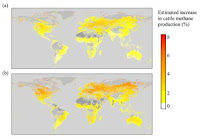An important discovery surrounding plants used to feed livestock has been released by scientists. They report that plants growing in warmer conditions are tougher and have lower nutritional value to grazing livestock, potentially inhibiting milk and meat yields and raising the amount of methane released by the animals.
Scientists at the Royal Botanic Gardens, Kew, Scotland's Rural College (SRUC) and the Senckenberg Biodiversity and Climate Research Center, Frankfurt have published a paper revealing an important discovery surrounding plants used to feed livestock; that plants growing in warmer conditions are tougher and have lower nutritional value to grazing livestock, potentially inhibiting milk and meat yields and raising the amount of methane released by the animals. Higher amounts of methane are produced when plants are tougher to digest -- an effect of a warmer environment. Methane is a potent greenhouse gas, around 25 times better at trapping heat than carbon dioxide. More than 95% of the methane produced by cows comes from their breath through eructation (belching) as they "chew the cud.
Dr Mark Lee, a research fellow in Natural Capital & Plant Health at the Royal Botanic Gardens, Kew who led the research says; "The vicious cycle we are seeing now is that ruminant livestock such as cattle produce methane which warms our planet. This warmer environment alters plants so they are tougher to digest, and so each mouthful spends more time in the animals' stomach, producing more methane, further warming the planet, and the cycle continues. We need to make changes to livestock diets to make them more environmentally sustainable."
Read more at Making Cows More Environmentally Friendly

No comments:
Post a Comment